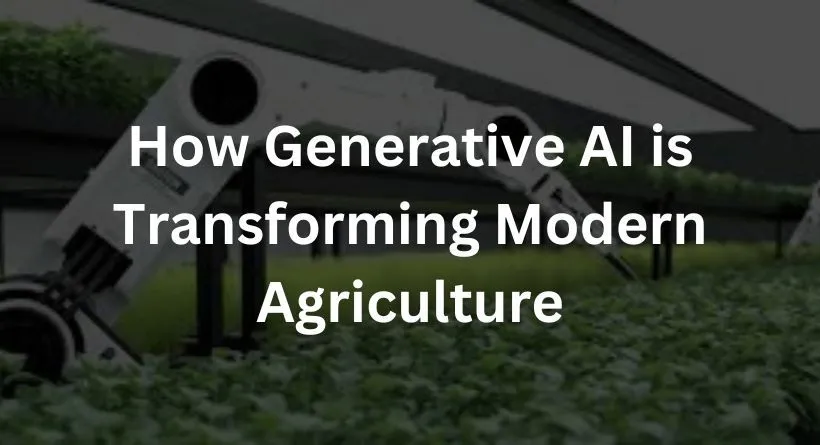
In a world faced with a rapidly growing population and increasing concerns about food security and sustainability, the agriculture industry is at a pivotal juncture. To meet the ever-changing demands, the industry must constantly evolve and innovate. Generative AI, a potent form of artificial intelligence that creates new data from existing data, holds the key to revolutionizing modern agriculture by driving efficiency, sustainability, and innovation. In this article, we’ll explore the various ways in which generative AI is transforming agriculture, from precision farming and crop optimization to resource management, pest control, and supply chain optimization.
The Power of Generative AI in Agriculture

Generative AI, in the context of agriculture, is a game-changer. It leverages advanced algorithms to analyze and process vast amounts of data, paving the way for a more sustainable and productive farming future. Here are the key areas where generative AI is making a significant impact:
You may also like reading: Generative AI Applications: In Government
1. Precision Farming: Generative AI for Enhanced Crop Management
Precision farming, which involves using advanced technologies to optimize agricultural practices and improve crop yields, is one of the most significant applications of generative AI in agriculture. By analyzing extensive datasets, including satellite imagery, weather data, and soil composition, generative AI algorithms can identify patterns and trends. This data-driven approach leads to more efficient and targeted farming practices, reducing resource waste and environmental impact.
2. Crop Optimization: Boosting Yields with AI-Driven Insights

Generative AI can also play a pivotal role in crop optimization. By analyzing data from various sources, including historical yield data, climate models, and genetic information, generative AI helps farmers identify the best crop varieties and cultivation techniques for their specific needs and conditions. This leads to significant improvements in crop yields and overall agricultural productivity.
3. Resource Management: Leveraging AI for Sustainable Farming Practices
Generative AI aids in promoting sustainable farming practices. It helps farmers optimize their use of resources such as water, fertilizers, and pesticides by analyzing data on soil composition, weather conditions, and crop health. This targeted approach results in cost savings, increased resource efficiency, reduced environmental impact, and long-term sustainability for the agriculture industry.
4. Pest Control: AI-Driven Solutions for Protecting Crops
Pest control is a critical aspect of modern agriculture. Generative AI enhances pest control strategies by analyzing data on pest populations, weather conditions, and crop health to predict potential outbreaks and recommend targeted interventions. This leads to improved crop yields, reduced environmental impact, and increased sustainability for the agriculture industry.
5. Supply Chain Optimization: Streamlining Agricultural Logistics with Generative AI
Effective supply chain management is essential for ensuring that agricultural products reach their intended markets in a timely and cost-effective manner. Generative AI offers a powerful solution by enabling the analysis of vast amounts of logistical data, identifying potential bottlenecks and inefficiencies, and optimizing supply chains accordingly. This results in significant cost savings and efficiency improvements.
6. Climate-Resilient Agriculture: Using Generative AI to Adapt to Changing Conditions
Climate change presents a significant challenge for the agriculture industry. Generative AI helps farmers adapt to changing conditions by analyzing data on climate trends, soil health, and crop performance. By identifying vulnerabilities and recommending targeted interventions, generative AI ensures that operations remain sustainable and productive in the face of increasing environmental uncertainty.
7. Advanced Breeding Programs: AI-Driven Crop Innovation

Generative AI plays a critical role in the development of advanced breeding programs. By analyzing large-scale genomic data, it identifies genetic traits associated with desirable characteristics, guiding researchers in creating novel crop varieties suited to modern challenges. This leads to breakthrough crop varieties that address food security, climate change, and sustainability challenges.
8. Farmer Education and Decision Support: AI-Driven Tools for Empowering Farmers
Generative AI empowers farmers by providing AI-driven tools and platforms that analyze and interpret agricultural data, offering actionable insights and recommendations to optimize practices. These tools bridge the gap between farmers and cutting-edge research, driving progress and innovation across the industry.
Conclusion
Generative AI is sowing the seeds of a promising future for agriculture. From precision farming to crop optimization, resource management, pest control, supply chain optimization, climate resilience, breeding programs, and farmer education, it is transforming every facet of the industry. As we embrace this technological revolution, we are better equipped to feed a growing global population and create a more sustainable and efficient agricultural landscape.
FAQs
1. How does generative AI help with precision farming?
Generative AI analyzes data from various sources, such as satellite imagery and weather data, to help farmers make more informed decisions about crop management.
2. What is the significance of crop optimization with AI?
Generative AI identifies the best crop varieties and cultivation techniques, leading to improved crop yields and enhanced agricultural productivity.
3. How does generative AI contribute to sustainable farming practices?
By optimizing the use of resources like water and fertilizers, generative AI ensures cost savings and reduced environmental impact.
4. What role does generative AI play in pest control?
Generative AI analyzes data on pests and crop health to predict and prevent potential outbreaks, improving crop yields and sustainability.
5. How does generative AI empower farmers with decision support tools?
AI-driven tools provide farmers with actionable insights and recommendations, bridging the gap between farmers and cutting-edge research, and driving innovation in the industry.





